Office Updates
In Case You Missed It: Awards Announced and New Funding Available
 Tribal Clean Energy Planning and Development - 2025 (DE-FOA-0003401)
On Sept. 27, the Office of Indian Energy announced $18.8 million awarded for clean energy infrastructure and an additional $25 million in funding available for clean energy planning and development.
The $25 million in new funding is focused on providing Indian Tribes and eligible Tribal entities resources to plan, assess, or develop clean energy projects—creating a pipeline of projects ready for final design and clean energy technology installation. This funding is intended to address gaps in federal funding for the early phases of project development.
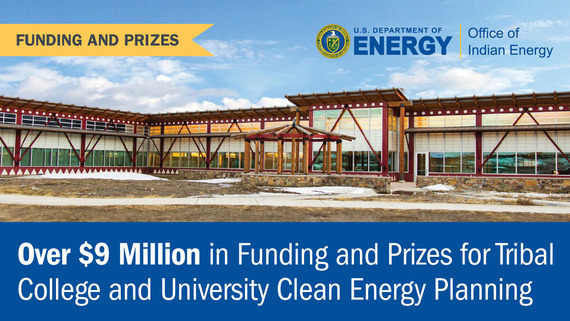 Over $9 Million in Funding and Prizes for Tribal Colleges and Universities to Advance Clean Energy
On Sept. 26, the Office of Indian Energy also announced over $9 million in funding and prizes to support Tribal Colleges and Universities (TCUs) in their efforts to advance clean energy projects and bolster food sovereignty initiatives on their campuses.
View the announcement above for details, and please join our upcoming webinars to learn how TCUs can participate and apply.
News
Community Microgrid Assistance Partnership Now Open for Project Proposals
 The U.S. Department of Energy (DOE) Community Microgrid Assistance Partnership is focused on electrically isolated and underserved communities in Alaska, Hawaii, and Tribal lands in the Great Plains and Southwest.
With the Community Microgrid Assistance Partnership, you can plan a resilient microgrid system, make improvements on an existing system, build workforce capacity, or add renewable energy.
This program will build a knowledge network around microgrid development and innovation in rural communities and deploy technology solutions that can be replicated nationwide. Interested community leaders and developers can request technical assistance for developing a project proposal.
Awards range from $200,000–$650,000, and applications are due by Dec. 20, 2024.
DOE Announces Selectees for Clean Energy Projects Led by Tribal and Local Governments
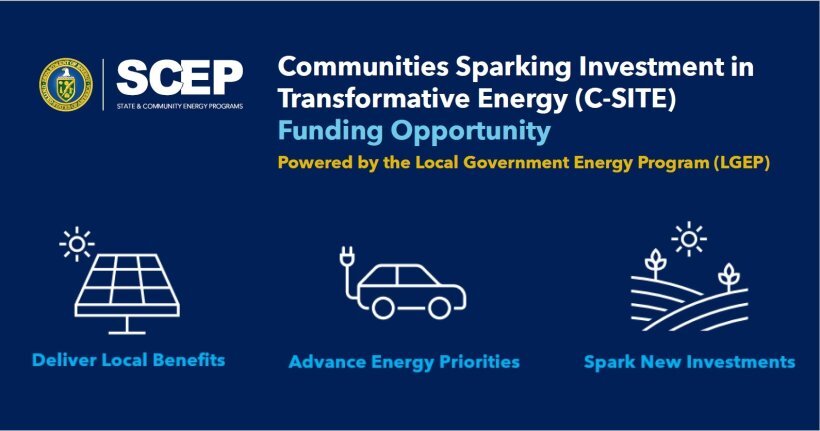 On Sept. 5, DOE announced the selection of 12 local governments and Tribes to receive over $31 million in funding through the Communities Sparking Investments in Transformative Energy (C-SITE) funding opportunity (an opportunity originally announced at the Tribal Clean Energy Summit in February). Under DOE’s new Local Government Energy Program, C-SITE supports the implementation of high-impact clean energy projects in disadvantaged communities, energy communities, and small- and medium-sized jurisdictions.
-
Hopi Utilities Corporation in Arizona will add a behind-the-meter, grid-tied battery energy storage system to store excess power from an existing microgrid to build energy resilience, decrease reliance on diesel generators, and reduce high costs of unreliable energy for the Hopi Tribe (award amount: $3,400,000).
-
Native Village of Kotzebue in Northern Alaska, in collaboration with Kotzebue Electric Association, Kikiktagruk Inupiat Corp., Inc., the Northwest Arctic Borough, and Atautchikun, LLC., will invest in local, Tribally produced renewable solar energy and leverage decommissioned wind turbine infrastructure to improve resilience and reduce energy costs (award amount: $3,350,000).
-
Red Lake Band of Chippewa Indians in Minnesota will invest in an innovative, behind-the-meter microgrid system to provide electricity for a secondary school complex, building toward a larger cooperative network and energy sovereignty and resilience in rural Tribal communities (award amount: $3,150,000).
Biden-Harris Administration Announces $71 Million To Electrify Homes Across Indian Country With Clean Energy Through President’s Investing in America Agenda
Funding from the Tribal Electrification Program will help close access-to-electricity gap in 13 communities
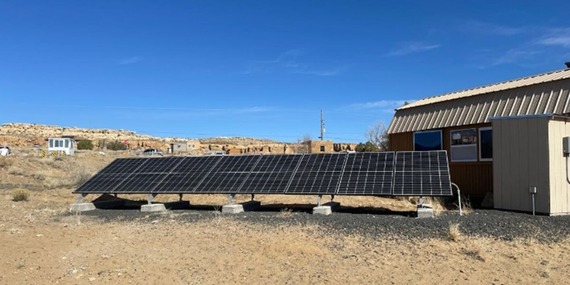 This announcement follows the program’s first round of funding of $72 million awarded to 21 Tribes and Tribal organizations in March 2024.
On Sept. 26, the U.S. Department of the Interior announced a $71 million investment from President Biden’s Investing in America agenda to electrify homes in 13 Tribal communities across Indian Country, helping to close the Tribal access-to-electricity gap.
This second and final round of funding from the Bureau of Indian Affairs’ Tribal Electrification Program is part of an overall $150 million commitment to provide financial and technical assistance to connect homes in Tribal communities to transmission and distribution that is powered by clean energy; provide electricity to unelectrified homes through zero-emissions energy systems; transition electrified homes to zero-emissions energy systems; and support associated home repairs and retrofitting necessary to install the zero-emissions energy systems. In addition, the program supports clean energy workforce development opportunities in Indian Country.
- Rosebud Sioux Tribe: $11,850,000
- Red Lake Band of Chippewa Indians: $8,738,100
- Navajo Tribal Utility Authority: $7,376,200
- Eastern Shoshone Housing Authority: $7,375,000
- Bois Forte Band of Chippewa: $6,479,000
- Hopi Utilities Corporation: $6,060,459
- Kootznoowoo, Incorporated: $5,998,319
- Yurok Tribe: $4,300,143
- Quinault Indian Nation: $3,948,800
- Levelock Village: $3,313,979
- Tanana Chiefs Conference: $3,000,000
- SAGE Development Authority (Standing Rock Sioux Tribe): $2,000,000
- Ewiiaapaayp Band of Kumeyaay Indians: $560,000.
Economic Development Administration Announces Additional $5 Million To Support Indigenous Communities
On Oct. 1, the U.S. Economic Development Administration announced an update to the Public Works and Economic Adjustment Assistance Program funding opportunity, including an addendum to provide $5 million for Indigenous communities.
The U.S. Economic Development Administration encourages eligible applicants to submit non-construction projects that provide capacity-building, planning support, and technical assistance to support the future implementation of foundational economic infrastructure. Foundational economic infrastructure can include broadband, energy, road, water, and wastewater infrastructure (including community water facilities); vocational and higher education facilities; and community health and childcare facilities that are necessary for job creation and economic mobility.
Projects can also provide technical assistance to support business development, entrepreneurship assistance, economic development planning, rural prosperity, and workforce training in Indigenous communities.
DOE Awards $4.1 Million Financial Assistance Cooperative Agreement to Santa Fe Indian School
 Los Alamos National Laboratory supports a variety of K-12 STEM education events and programs with technical assistance, volunteers, and financial assistance.
On Sept. 26, DOE awarded a noncompetitive financial assistance cooperative agreement to the Santa Fe Indian School in New Mexico.
The agreement will focus on providing a rigorous STEM curriculum for Native American students in environmental and agricultural sciences with exposure to STEM careers, partnering with Los Alamos National Laboratory for mentorship opportunities and using innovative technologies to support student learning and application.
The program works in conjunction with local Tribal communities to address their needs related to STEM for environmental monitoring, pollution studies, and more.
Funding Opportunities
Printable Flyer: Tribal Clean Energy Funding Opportunities
- Energy Improvements in Rural or Remote Areas
- Large Animal and Solar System Operations (LASSO) Prize
- 2024 Clean School Bus Rebate Competition
- American-Made Community Power Accelerator Prize
- Clean Energy to Communities.
Energy Improvements in Rural or Remote Areas – Fiscal Year 2025 Release
$400 million
Concept papers due Feb. 27, 2025; full applications due Aug. 28, 2025.
On Oct. 3, DOE opened applications to spur innovative, community-focused, clean energy solutions for rural and remote communities across the United States. The funding will include federal awards from $2–$50 million to help communities lead in developing tailored clean energy projects best suited for their unique needs.
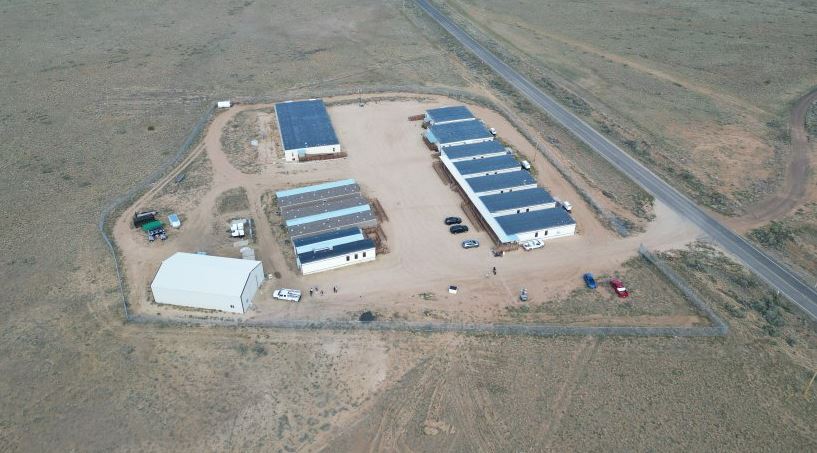 The Hopi Nation Community Solar Project was selected for federal cost share up to $9.1 million in the previous round of Energy Improvements in Rural or Remote Areas funding.
New DOE Prize Explores the “Moo”tual Benefits of Cattle Agrivoltaics
Over $8 million
Phase 1 applications due March 6, 2025.
The American-Made LASSO Prize offers more than $8 million in cash prizes to bring cattle agrivoltaics projects to life. Solar developers, farmers, ranchers, researchers, product developers, local utilities, and other solar and agricultural stakeholders can participate.
The LASSO Prize will bring together multiple stakeholders to develop innovative colocation practices, build pilot sites, and share information on best practices, costs, energy, and agricultural outcomes.

2024 Clean School Bus Rebate Competition
$965 million
Applications due Jan. 9, 2025.
The Bipartisan Infrastructure Law authorizes the U.S. Environmental Protection Agency to offer rebates to replace existing school buses with clean and zero-emissions models.
Applicants can request up to $325,000 per bus for up to 50 buses per application. Funds can be used to cover bus and infrastructure costs for awardees requesting electric school buses, as well as eligible training costs for bus drivers, electricians, and others working with the new buses or infrastructure.
Eligible applicants include Indian Tribes, Tribal organizations, and Tribally controlled schools, along with public school districts and other school transportation agencies and third parties.

American-Made Community Power Accelerator Prize
$10 million
Apply by Dec. 17.
Round 3 of the Community Power Accelerator Prize expands beyond community solar to include other forms of distributed solar energy technologies. The $10 million prize from DOE is designed to fast-track the efforts of new, emerging, and expanding solar developers and co-developers to learn, participate, and grow their operations to support successful distributed solar projects.
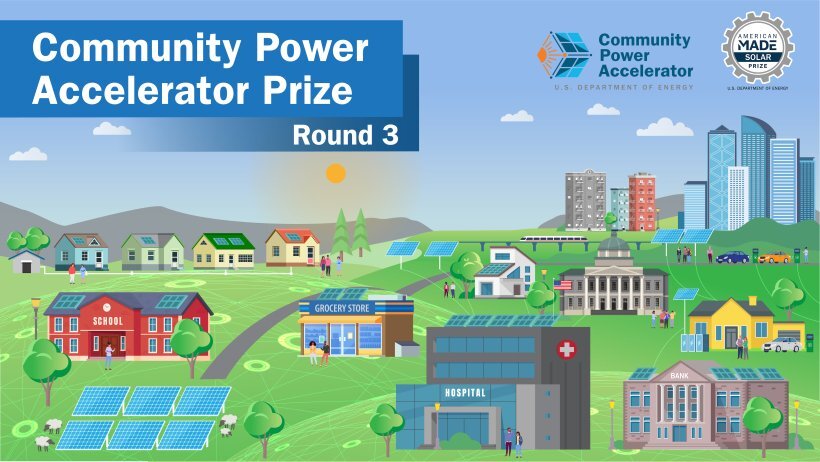
C2C Peer-Learning Cohorts
Apply by Oct. 31.
DOE’s Clean Energy to Communities (C2C) program is currently offering support to local and regional governments, Tribes, municipal and cooperative utilities, and community-based organizations to help them set and reach their clean energy goals.
C2C is launching three new C2C peer-learning cohorts on the topics of: distributed wind, renewable energy and energy efficiency 101 in Appalachia, and microgrids.
Participants in C2C peer-learning cohorts receive free strategic and technical assistance; access to materials and resources, including templates, training, tools, best practices, and analyses; and the chance to collaborate with others across the United States facing similar opportunities and challenges.
Events
- IRS Office Hours for Elective Pay and Transferability of Clean Energy Credits
- TCU Energy and Food Sovereignty Nexus Prize Informational Webinar
- TCUs Planning for Clean Energy Transition FOA Webinar
- Alaska Federation of Natives 2024 Convention
- Tribal Home Energy Rebates Office Hours
- Tribal Clean Energy Planning and Development FOA Webinar
- NCAI 81st Annual Convention & Marketplace
- Office of Indian Energy 2024 Program Review.
IRS Office Hours for Elective Pay and Transferability of Clean Energy Credits
📅 Oct. 16, 30; Nov. 13 | 1–2:30 p.m. ET
The IRS is hosting office hours to assist organizations and entities with the prefiling registration process and the IRA/CHIPS Pre-filing Registration Tool for elective payment and transferability of clean energy and CHIPS credits. Subject matter experts from Large Business & International and Tax Exempt/Government Entities are available to answer questions.
For more information, visit us at IRS.gov/tribes or IRS.gov/cleanenergy.
TCU Energy and Food Sovereignty Nexus Prize Informational Webinar
📅 Oct. 15 | 3 p.m. ET
This is a 1-hour webinar covering important information about the TCU Energy and Food Sovereignty Nexus Prize. This prize is exclusively available to students and faculty at TCUs. During the webinar, prize administrators will cover prize goals, key dates, how to submit your application, and more.
TCUs Planning for Clean Energy Transition FOA Webinar
📅 Oct. 17 | 3 p.m. ET
The Office of Indian Energy will provide information to potential applicants on the Tribal Colleges and Universities Planning for Clean Energy Transition FOA.
Alaska Federation of Natives 2024 Convention
📅 Oct. 17–19 | Anchorage, Alaska
The annual convention serves as the principal forum and voice for the Alaska Native community in addressing critical issues of public policy and government. The convention convenes thousands of official delegates and participants from membership organizations across the state.
Tribal Home Energy Rebates Office Hours
📅 Oct. 22, Nov. 19, Dec. 17 | 4 p.m. ET
During these sessions, DOE will provide technical assistance to Tribes and Tribal representatives working on Home Electrification and Appliance Rebates funding applications.
Tribal Clean Energy Planning and Development FOA Webinar
📅 Oct. 24 | 3 p.m. ET
The Office of Indian Energy will provide information to potential applicants on the Tribal Clean Energy Planning and Development FOA.
National Congress of American Indians - 81st Annual Convention & Marketplace
📅 Oct. 27–Nov. 1 | Las Vegas, Nevada
Join the National Congress of American Indians to celebrate more than eight decades of defending Tribal sovereignty and advancing the rights of Tribal Nations.
Office of Indian Energy 2024 Program Review
📅 Nov. 18–22 | Denver, Colorado
This annual event is an opportunity for Tribal Leaders and staff to meet, learn from other Tribes pursuing clean energy projects, and share in each other's successes.
Here's what's catching attention on our social media pages. Follow us on LinkedIn, Facebook, and X and for the latest updates.
|